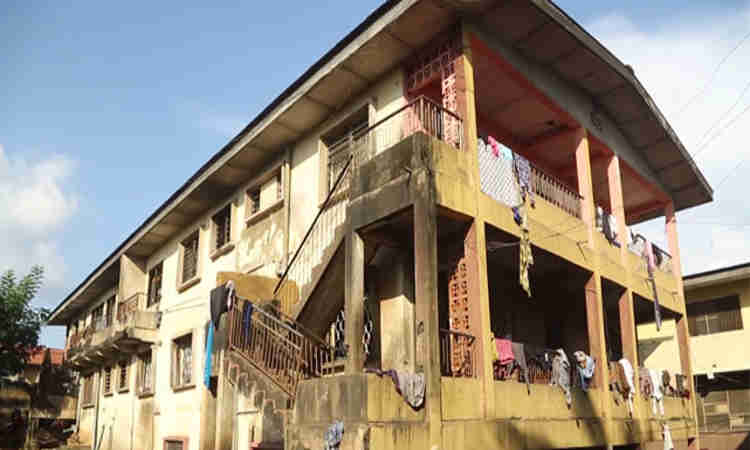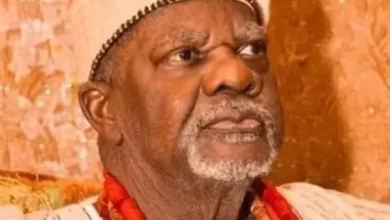
By Marufh Bello
At around 12.30am on Tuesday 5, 2019, I had a phone call from a friend’s wife. “Hello, sir!” “Hello, madam!” I answered in a familiar tone because I had her number on my contact list. “Please, sir, do you know the whereabouts of our husband? He has not been home since he left on Monday morning.” I spontaneously responded, “No! What about him? Where did he go? I did not go out with him today.”

“He told us in the morning that he was going to secretariat over his suspension matter and we were only able to speak with him last around 7 pm yesterday. When we put a call to him he was not talking audibly enough. He only managed to tell us he was attending to some issue,” my friend’s wife said.
“OK,” I replied, “We will look into the matter when the day breaks.” The woman was seriously disturbed the way she sounded on the phone just as I. I could not close my eyes for a very long time imagining what might be going on in the mind of the woman and the entire family. I was seriously disturbed too, thinking whether any evils had befallen a dear friend because our world today, particularly in my country, is rife with all dimensions of unimaginable aggression and evils occasioned by the grinding poverty, oppression and maladministration in the land.
Before he was suspended on August 1, 2019, over an allegation of moving government vehicles numbering “56” to “unknown destinations”, my friend was a director in the Oyo State Civil Service in charge of maintenance of the governor’s fleet. On the allegation of “unauthorized” movement of vehicles, he was issued a query and it was responded to by my friend with over a hundred pages of supporting evidential documents that he did not take the government’s vehicles to “unknown destinations” without the approval of the superior officers as the practice was at the moment when the vehicles were being released to the government-registered mechanics. Shortly after the allegation came up, an order came that the vehicles be moved back into the government yards. Yes, all the vehicles were moved, towed back into the government yards through OYSTROMA, the state road and transport management agency. Almost two weeks later when all the vehicles had been moved back into the government yards, my friend was handed a suspension letter which was to last for two months. He had been on suspension without salary for three months before he disappeared from home. Although his letter of suspension read two months which ought to terminate on October 1, he was still on suspension extended without any written notification when he was mistakenly picked up by the police team of anti-illegal “detention” centres in Ibadan which raided Owode, Apata area, on Monday, 4 November, 2019. Taking “vehicles to unknown destinations” is a story for another day.
It was when the day broke on Tuesday 5 that we realised my friend had been wrongly arrested by the anti-illegal “detention” centres squad from Iyaganku State Command. We got to know, after frantic efforts, that he had been picked up by the policemen on the street of a friend he had gone to visit on the fateful day. The friend was just lucky to escape arrest. Since the night of November 4, around 7.30pm precisely, my friend’s phone was no longer ringing. Everybody was disturbed because he is a complete responsible gentleman. We later learnt that he had been dispossessed of his mobile phone so he could not communicate with anybody, even his family members. It was when we luckily got through to the friend he went to visit that we realised he had been in police net for the offence he knew nothing about.
My friend had left secretariat, Agodi, Ibadan, to see his friend at Apata after making efforts to secure his recall back to office. He parked his car in front of the mosque where the raid was carried out and was discussing with his friend inside the car. He did not know there was such an illegal activity going on in the area. A member of the police squad accosted him, and he showed them his Oyo State Government ID card as a director in the service. He told them he did not know or have any relationship with the suspects they were out to arrest. He said he only came to visit a friend. They did not listen and he was driven straight to Iyaganku. On their way to Iyaganku, he pleaded with them to let him know where he was being taken to so he could tell his family. Rather, the officer (Sergeant OT, not real name) sitting beside him seized his phone from him and rendered him incommunicado. That was why everybody was in the dark over his whereabouts till the following morning I visited Iyaganku and I saw him locked up in the cell. Was that a legal arrest or legalized “kidnapping”? No warrant of arrest! No effort to separate chaffs from the wheat! His inviolable human right to freely communicate was violated without having been established he was guilty or a suspect! Everybody is a criminal before the officers of Kabana Republic. He was just hauled behind the bars!
Having realised my friend was in the police net, I tried to see him face to face. I had to bribe my way through. When I got to the section where he was celled, with the rope of his native trousers removed, he was called out just like every other criminal. I, at last, saw him but was not allowed to speak with him. Officer Aunty Temi (not real name) was a very shrewd officer. I said to her, “Well done, ma. I’m here to see my friend who was raided at Apata yesterday.” She replied, “What’s his name?” I mentioned my friend’s name. Then, she turned her back to the other people at the counter and faced me and said in a low voice, “You’ll give us something o… because our boss had instructed us not to allow anyone to speak with any of the suspects in the cell.” Honestly, I was not ready to offer anything but I wanted to confirm and see that my friend was truly in their custody. I hesitantly said, “Madam, I don’t have much here…” She said hastily, “How much do you have? Please talk in time. If my boss arrives now, you won’t be able to see him again o!” Aunty Temi’s face changed, became fiercely unfriendly. I did not want to steer her anger further and I said in a low voice with a light smile, “I have 150 naira.” She looked at me like a persona non grata and said, “Please go! Do you want me to take such a big risk without something?” She frowned and turned her back on me. Because I had to be sure my friend was there, I pleaded and pleaded and later she gave in to my plea as another male officer on the same counter looked on.
“Hakeeb Salimon!” Everybody, including the inmate who manned the cell gate, helped call out to my friend. He emerged looking frustrated. I was relieved when I saw him and confirmed truly he was there. All along I was not sure he was there until I saw him. He did not immediately know I was the one until I told him I was the one —I mentioned my name and he heard my voice. That situation gave me the impression that maybe the cell was not well illuminated. There was a barricade of counter like the Red Sea separating Egypt from the Middle East. I could not come close to my friend, neither could he. My friend gestured to me to come closer so he could talk to me. Officer Temi turned down the opportunity to speak with him. My friend already frustrated, perhaps he had never eaten since he was arrested, was very upset. Out of frustration, my friend flared up and accused the woman of being irresponsibly usurping his fundamental human rights.
Officer Temi was also angry with the reaction of my friend. Officer Temi refused to let me talk with my friend even for 30 seconds. I left the counter so as not to aggravate the situation. I left to go and bring my lawyer friend whom I had met on my way coming into the station. I told him I had seen my friend but was denied talking with him. My lawyer friend obliged my request to follow me there. On arrival, my friend was called out again and the lawyer asked to speak with him. The request was turned down again by Aunty Temi. She said my friend was unruly. My friend got mad at her again, raging, raking and pointing to her from behind the bars. Officer Temi stood her ground and we were sent away the second time, although she agreed I should bring my friend something to eat. Soon I came back with a big loaf of bread and a half bag of sachet water.
Aunty Temi collected the items from me, and having asked me to have a taste of the bread, she passed it to my friend inside the cell. My friend did not bother to come out(side) again, although I had assured him he would be out the following day. I swung into action with other friends and necessary contacts were made to the appropriate quarters to establish my friend’s innocence, unlawful detention and harassment. Before the close of the day on Tuesday, the Executive Assistant to the Governor on Security Matters had reached out to the command and necessary authorities. There and then, my friend’s bail was secured after the head of the sect arrested declared that he had never met Mr. Salimon for once. He said Mr. Salimon, my friend, was innocent and wrongly arrested. Innocent after he had been molested, harassed and kept behind bars from Monday to Wednesday?
Good to be on record that the camps presently referred to as illegal “detention” centres were actually Islamic correctional and/or rehabilitation outfits where parents and/or guardians freely patronize to drop their outcast children, wards and relatives who had been on drugs or had become hardened criminals and street urchins. We have been living with these centres for ages! Is having such a facility, which has been abused by the owners, not a ripple effect of the failures of government across board in Nigeria?
Members of the Nigeria Police Iyaganku Command, according to a media report, had stormed the Olore Islamic rehabilitation centre at Oojo and Apata, Ibadan, a facility now referred to as a horror house, and “Police rescue 259 inmates from the Ibadan house of horror,” as captioned in the Punch of 5 November, 2019. The conditions of the inmates were terribly bad, really, as signs of malnourishment, hunger and deprivation of basic social and medical needs were written all over them. The space for accommodation at the centre was another issue as the camp looked overcrowded and unkempt.
When my friend was to be released, another issue cropped up. His phone was missing. My friend said to the officers at the booking counter that Officer OT collected the phone from him when he, at the point of his arrest, was trying to contact his family at home. My friend informed that Officer OT told him he could not be making calls while under arrest. He said he seized the phone from him forcefully and was asked to drive his car by himself with Officer OT sitting right beside him in the front, while other officers sat at the back. The vehicle was driven to the Gender Unit, CID of the station. As soon as the vehicle was parked at the station, my friend, Hakeeb, said Officer OT retrieved the car key from him. Officer OT now had two items with him —the car key and the phone.
At the intervention of the Special Assistant to the State Governor on Security Matters and when all papers for his release had been completed, my friend’s bail was secured at no fee, I learnt, on Wednesday 6. Having regained his freedom, his two laptops, wristwatch, the car key and other items were released to him except his phone, NOKIA 6.1+ 2018 model. Officer OT was summoned and it was later discovered that he did not book the phone as part of the seized items. My friend said it to Officer OT’s face that he seized the phone from him immediately he was arrested even before “we reached here.” Officer OT was said to be very furious at my friend for saying that in front of his colleagues. He insisted he dropped the phone at the booking desk. It was however later confirmed he did not drop the phone at the desk as there was no record of booking at all. My friend insisted the phone was in Officer OT’s custody. My friend said the officer became more annoyed and threatened to deal with him while having his rifle gun with him. Other officers at the desk calmed my friend down and promised to get him the phone. My friend left the station without his phone and the car. My friend, Hakeeb Salimon (not real name) got back home around 1 pm on Wednesday, 6 November, 2019.
Hakeeb was able to get his phone back on Friday because nobody was available to attend to my friend when he visited the station on Thursday, a day after his release. The phone was discovered to have been kept in the Officer OT’s superior’s office in a “black” polythene bag. I asked a question when I learnt about this. Why was the phone not booked and kept with other seized items at the approved booking desk? When my friend got his phone, surprisingly he did not get back home with the phone. The phone was snatched from him by an Okada rider (motorcyclist) along Agodi-Gate-Mokola road in a circumstantial manner. The Okada rider had stopped to pick him at Gate to take him to Mokola. All of a sudden, the rider stopped midway and complained that something was wrong with his motorcycle. My friend and the other passenger had to disembark from the bike to allow him to fix the fault. Having alighted from the motorbike, the biker mounted his bike pronto and zoomed off without his passengers anymore. Alas! My friend’s phone (in his chest pocket) had gone! It was at that moment that my friend discovered that the cyclist faked the said mechanical fault. My friend had to report the loss at the police headquarters and he was told that he would have to pay ten thousand naira to help him recover the phone. My friend, who had been on suspension for more than three months without salary, could not pay the bill. Till the moment I wrote and published this diary, my friend’s phone remained lost and the car is still in police custody for further investigation. Illegal arrest, legalized “kidnapping”, harassment and attendant uncompensated loss you would call this?
This barbaric conduct and approach of our officers has been ongoing unabated for ages in Kabana Republic. Our officers remain unready to change and be civil in the way they handle their fellow citizens. Do our officers know or learn anything about “Cimic”, a civil-military PR approach which ensures good handling and relationship between the force apparatus and other citizens? When will this uncivilized corrupt attitude stop among our men and women in the force? Methink our men should change their strategies of arresting suspects and clamping down on criminals. Do not our men and women in the force think allowing suspects and arrestees in their custody to use their phones to communicate could give them a hint about their true personalities? Why denying people their right to free speech while they are still suspects in police custody? Why delaying suspects for more than 24 hours in police custody without arraignment and trial? A lot of ugly things happen in the cell, according to my friend and others who have experienced the system. OK, when you are denied access to your mobile phone, an officer would later offer a suspect in their custody an opportunity to call a number he had crammed at a fee like one thousand naira or five hundred naira. And if you are either unable to have any crammed number or penurious, woe betide you!
*Marufh Bello is an independent journalist, book editor, author and publisher.








